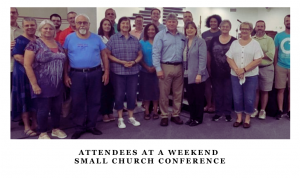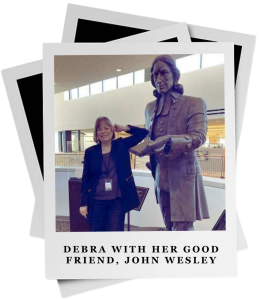Dr. Debra White Smith: The Wesleyan Woman
Biblical Concepts from a Wesleyan Perspective
Educating Small-Church Pastors & Lay Leaders
 After completing her doctoral dissertation on the topic of the education of small-church pastors, Dr. Debra White Smith has accepted God’s call to minister to and educate small-church pastors and lay leaders. Debra and her husband, Daniel, have partnered as co-lead pastors in small churches for over fourteen years. Both her pastoral experience and her academic endeavors have fueled Debra’s desire to empower small-church pastors and lay leaders with the tools necessary to lead their churches to spiritual and organizational health. Small churches exist in the context of a consumer culture that poses a challenge but can be navigated with the right leadership tools, initiatives, and focus, resulting in small churches fulfilling the Great Commission. Debra’s dissertation findings were published in the reputable Pastoral Psychology journal. Click the following link to read her article: “Ministerial Training on Consumer Culture and Volunteer Management May Prevent Burnout for Small-Church Clergy.”
After completing her doctoral dissertation on the topic of the education of small-church pastors, Dr. Debra White Smith has accepted God’s call to minister to and educate small-church pastors and lay leaders. Debra and her husband, Daniel, have partnered as co-lead pastors in small churches for over fourteen years. Both her pastoral experience and her academic endeavors have fueled Debra’s desire to empower small-church pastors and lay leaders with the tools necessary to lead their churches to spiritual and organizational health. Small churches exist in the context of a consumer culture that poses a challenge but can be navigated with the right leadership tools, initiatives, and focus, resulting in small churches fulfilling the Great Commission. Debra’s dissertation findings were published in the reputable Pastoral Psychology journal. Click the following link to read her article: “Ministerial Training on Consumer Culture and Volunteer Management May Prevent Burnout for Small-Church Clergy.”
Inspiring Women to Recognize their Value & Impact
The Wesleyan Woman also supports a lifetime initiative from Dr. Debra White Smith to proclaim a Wesleyan view of scripture that empowers women to be the spiritual powerhouses God has called them to be. Churches influenced by John Wesley’s teaching believe that scripture should interpret scripture; and Debra offers teaching that closely follows this mantra.
Debra’s heart is to inspire women to:
- Consecrate their lives to Christ (Romans 12:1);
- Accept the scriptural call to holiness (1 Peter 1:13-16);
- Become prayer warriors for their families and nation (Ephesians 6:10-18);
- Fully embrace a biblical view of women as joint heirs with Jesus (Romans 8:16-17; Philippians 2:12) and equally valuable and influential in the world, the church, and their homes (2 Timothy 1:5-6; Galatians 3:28; Acts 10:34-35);
- Answer God’s call to be a catalyst for spiritual renewal and revival (Acts 2:17-21).
In the spirit of Christ’s command, “So in everything, do to others what you would have them do to you” (Matthew 7:12), Debra also encourages women to value and respect the men God has placed in their lives.
Promoting Scriptural Holiness
“The message of holiness is in no way outdated. God still calls us to embrace, live, and preach holiness. ‘Therefore, with minds that are alert and fully sober, set your hope on the grace to be brought to you when Jesus Christ is revealed at his coming. As obedient children, do not conform to the evil desires you had when you lived in ignorance. But just as he who called you is holy, so be holy in all you do; for it is written: ‘Be holy, because I am holy’’ (1 Pet 1:13-16).
When we speak of living a holy life, many Christian people claim they cannot achieve holiness, so they deny that living a holy life is possible. They think that the calling is impossible because they do not have the power to fulfill it. The truth is that human beings cannot live a holy life through their own effort and power. However, if living a holy life was not possible, the Lord would not call us to do so; the Bible would not repeatedly urge us to an experience that is impossible to live. Any consecrated believer can live a holy life through the indwelling presence of the Holy Spirit. Scripture speaks of a sanctifying grace that the Lord supplies for us to live a holy life: ‘He has saved us and called us to a holy life—not because of anything we have done but because of his own purpose and grace. This grace was given us in Christ Jesus before the beginning of time’ (2 Tim. 1:9).
[Debra believes that] entire sanctification is a biblical concept that must not be ignored. God’s sanctifying grace gives us the power to live a life pleasing to him, a life victorious over willful, known sin…. If there is ever an hour when church pastors and lay leaders need to refocus, not only on experiencing entire sanctification, but also on teaching this biblical truth, it is now. If we are to impact our culture for Christ through his power, the holiness message of entire sanctification must not be marginalized, minimized, or explained away. The holiness message must be centralized, maximized, and explained clearly” (Excerpt from Small Church Big Impact by Debra White Smith, The Foundry Publishing, 2025).
Debra teaches that entire sanctification is not a place of arrival, but a place of beginning that involves:
- A Point in Time when we consecrate all we are to Christ, and He cleanses our hearts of self-centeredness, known as carnality, so that we no longer live a lifestyle of willful, known sin. We no longer live for self; we live for the Christ whose love has dispelled our self-centeredness (1 Thessalonians 5:23 & 1 John 3:6-10);
- A Process in which the Lord continuously refines our hearts, renews our mind, delivers us from infirmities, flaws, and the past, and gives us grace to ask for forgiveness when we miss the mark (Psalm 19:12-13 & Romans 12:1-2);
- A Practice that involves committing to a powerful prayer life, daily consecrating our lives to the Lord, staying in the Word of God, and being set aside for His service (Psalm 46:10 & Proverbs 3:5-7).
One of the theme verses of the entirely sanctified believer is Galatians 2:20: “I have been crucified with Christ and I no longer live, but Christ lives in me. The life I now live in the body, I live by faith in the Son of God, who loved me and gave himself for me.”
